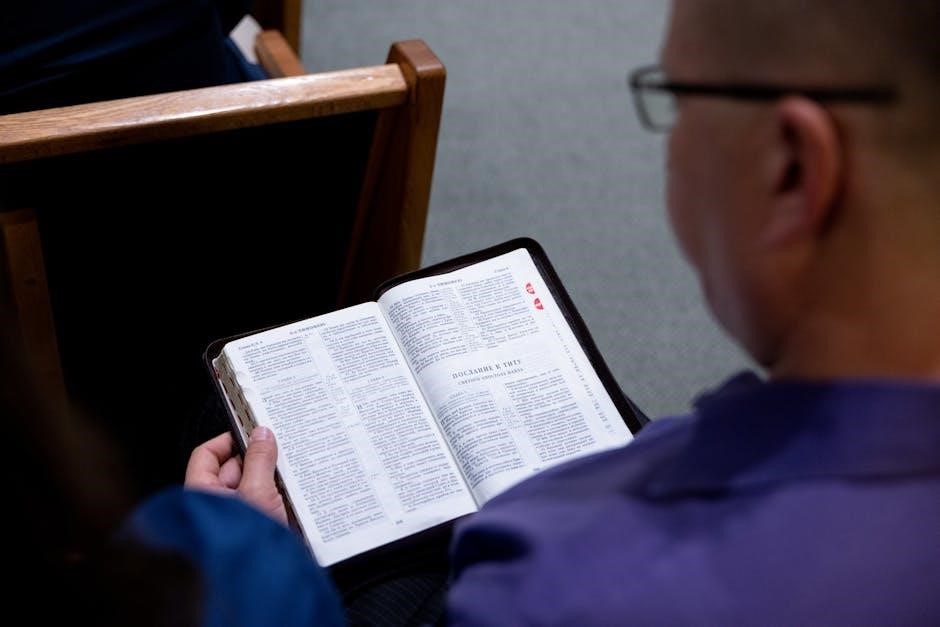Celebrate Recovery Step Study Book 2 focuses on steps 5-8, offering practical strategies and biblical principles to deepen recovery. It builds on the foundation established in Book 1, guiding participants through personal growth and healing.
1.1 Overview of the Celebrate Recovery Program
Celebrate Recovery is a 12-step program founded by John Baker, designed to help individuals heal from a variety of life challenges. Rooted in biblical principles, it combines the 12-step approach with Christian teachings to address issues like addiction, codependency, and emotional struggles. The program emphasizes community support, accountability, and spiritual growth. It is open to anyone seeking recovery, providing a safe space to share experiences and apply practical steps toward healing. The program includes weekly meetings, small group discussions, and step studies, all aimed at fostering personal transformation and helping participants live a Christ-centered life. Its goal is to empower individuals to overcome their struggles and grow in their relationship with God.
1.2 Importance of Step Study Book 2
Step Study Book 2 is essential for deeper healing and growth in the Celebrate Recovery program. It builds on the foundations of Book 1, guiding participants through steps 5-8, which focus on admitting the need for recovery, taking responsibility, restoring relationships, and growing in spiritual maturity. This book provides practical strategies and biblical principles to address personal struggles and destructive behaviors. By engaging with the content, participants gain a deeper understanding of their issues and develop tools to overcome them. The step-by-step approach fosters accountability and transparency, encouraging individuals to apply the teachings of Christ to their lives and experience lasting transformation.
1.3 Structure and Content of Book 2
Celebrate Recovery Step Study Book 2 is structured to guide participants through steps 5-8 of the program. Each step is divided into lessons, with exercises and reflections to deepen understanding. The book emphasizes biblical principles, providing practical applications for recovery. Step 5 focuses on admitting the need for recovery, while Step 6 encourages taking responsibility. Step 7 centers on restoring relationships, and Step 8 emphasizes spiritual maturity. The content includes personal stories, scripture references, and group discussion prompts. Assignments and reflection questions help participants apply the teachings to their lives. The book is designed for individual and group study, fostering accountability and spiritual growth through a Christ-centered approach.

Step 5: Admitting the Need for Recovery
Step 5 focuses on admitting the need for recovery, helping individuals confront their struggles and seek divine guidance for personal transformation and healing through faith.
2.1 Understanding Step 5
Step 5 in Celebrate Recovery focuses on admitting the need for recovery, emphasizing honesty and humility. It encourages individuals to confront their struggles and seek divine guidance, breaking free from denial. This step highlights the importance of acknowledging personal limitations and the necessity of spiritual support. Participants are guided to take responsibility for their actions and embrace a willingness to change. By fostering a deeper connection with God, Step 5 provides a foundation for healing and transformation. It is a critical phase where individuals begin to let go of self-reliance and instead rely on faith and community for recovery.
2.2 Key Themes in Step 5
Key themes in Step 5 include honesty, humility, and self-awareness. Participants are encouraged to confront their struggles openly, letting go of denial and embracing vulnerability. This step emphasizes the importance of surrendering pride and acknowledging the need for divine intervention. By fostering a deeper understanding of personal limitations, Step 5 helps individuals move beyond self-reliance and toward faith-based recovery. It also highlights the role of community support in the healing process, encouraging participants to share their experiences and seek accountability. These themes lay the groundwork for spiritual growth and lasting transformation, guiding individuals toward a more authentic relationship with God and others.
2.3 Biblical Principles Behind Step 5
Step 5 is rooted in biblical principles such as confession, humility, and trust in God’s grace. Key scriptures include 1 John 1:9, which emphasizes confessing sins to experience forgiveness, and James 5:16, highlighting the power of prayer and confession in healing. These principles encourage participants to surrender their struggles to God, acknowledging their inability to recover on their own. By aligning with these teachings, Step 5 fosters a deeper reliance on divine guidance and promotes spiritual growth. The biblical focus helps participants move from self-reliance to faith, creating a foundation for genuine transformation and healing.
2.4 Practical Applications of Step 5
Practical applications of Step 5 involve creating a written moral inventory, sharing it with a trusted sponsor or accountability partner, and prayerfully seeking God’s forgiveness. Participants are encouraged to reflect on specific areas of struggle, such as relationships or past hurts, and identify how these have impacted their lives. This step emphasizes transparency and humility, fostering personal accountability and spiritual growth. By applying these practices, individuals can experience freedom from guilt and shame, enabling them to move forward in their recovery journey with integrity and hope. These actions align with the biblical principle of confession and surrender, promoting deeper healing and transformation.

Step 6: Taking Responsibility for Recovery
Step 6 focuses on acknowledging past behavior, surrendering control, and committing to change. It emphasizes self-examination, accountability, and spiritual growth, empowering individuals to take ownership of their recovery journey.
3.1 Understanding Step 6
Step 6 in Celebrate Recovery Step Study Book 2 guides participants to recognize their need for change, surrender self-control, and commit to spiritual transformation. It emphasizes personal accountability, self-reflection, and reliance on divine guidance, fostering a deeper understanding of the recovery process. This step encourages individuals to confront their past actions, accept responsibility, and embrace the journey toward healing and growth. By addressing the root causes of their struggles, participants can move forward with renewed purpose and faith, aligning their lives with biblical principles for lasting transformation.
3.2 Key Themes in Step 6

Step 6 of Celebrate Recovery Step Study Book 2 focuses on themes of accountability, self-awareness, and surrender. It emphasizes recognizing the need for change, acknowledging past behaviors, and taking responsibility for personal actions. Participants are encouraged to surrender self-control and embrace spiritual transformation, relying on God’s guidance. The step also highlights the importance of self-reflection and honesty, allowing individuals to confront their flaws and weaknesses. By addressing these themes, participants can move toward genuine transformation, aligning their lives with biblical principles and fostering a deeper connection with their faith; This step serves as a cornerstone for lasting growth and healing in the recovery journey.
3.3 Biblical Principles Behind Step 6
Step 6 is rooted in biblical principles that emphasize surrender and accountability. It draws from teachings like Proverbs 28:13, which highlights the importance of confessing and forsaking sin, and 1 John 1:9, which assures forgiveness for confessed sins. The step encourages participants to surrender self-control to God, aligning with Galatians 2:20, where Paul describes living by faith in Christ. These principles underscore the necessity of humility, repentance, and trust in divine guidance. By applying these teachings, individuals embrace spiritual transformation, recognizing their inability to change on their own and relying on God’s power for healing and growth.
3.4 Practical Applications of Step 6
Practical applications of Step 6 involve surrendering self-control to God and actively seeking accountability. Participants are encouraged to identify and confess areas of wrongdoing, fostering humility and openness. Through journaling and sharing in small groups, individuals apply biblical truths to their lives. The step emphasizes the importance of living transparently, allowing others to support and guide them. By surrendering pride and embracing vulnerability, participants experience freedom from self-reliance, enabling deeper spiritual growth and healthier relationships. These practices help individuals move beyond surface-level changes to lasting transformation, rooted in reliance on God’s power and guidance.

Step 7: Restoring Relationships
Step 7 focuses on restoring relationships through sincere apologies, making amends, and seeking forgiveness. It emphasizes humility, empathy, and rebuilding trust, fostering healthier connections grounded in love and accountability.
4.1 Understanding Step 7
Step 7 focuses on restoring damaged relationships through sincere apologies and making amends. It encourages participants to take responsibility for their actions, seeking forgiveness and rebuilding trust. This step emphasizes the importance of humility, empathy, and honesty in healing relationships. By addressing past hurts and wrongs, individuals can move toward reconciliation and stronger, healthier connections. Biblical principles such as love, grace, and accountability guide this process, helping participants foster meaningful relationships rooted in mutual respect and understanding. Step 7 is a critical part of the recovery journey, enabling personal growth and fostering a supportive community.
4.2 Key Themes in Step 7
Key themes in Step 7 include taking responsibility for past harm, seeking forgiveness, and making amends. It emphasizes humility, empathy, and honesty in repairing relationships. Participants are encouraged to approach others with a willingness to listen and understand their perspectives. This step also highlights the importance of rebuilding trust and fostering healthy communication. Biblical principles such as grace, accountability, and love guide the process, helping individuals move toward reconciliation. Step 7 underscores the value of strong, supportive relationships in the recovery journey, promoting personal growth and a sense of community. By addressing past conflicts, participants can create a foundation for lasting, meaningful connections.
4.3 Biblical Principles Behind Step 7
Step 7 is rooted in biblical principles of forgiveness, reconciliation, and grace. It reflects Jesus’ teachings on restoring relationships (Matthew 5:23-24) and the importance of mercy (Luke 6:37). The step encourages participants to seek forgiveness humbly, aligning with 1 John 1:9, which assures forgiveness through confession. Biblical principles also emphasize accountability and love, guiding individuals to mend broken relationships. By applying these teachings, participants experience spiritual growth and healing, fostering a deeper connection with God and others. The process mirrors Christ’s example of reconciling people to Himself, illustrating the transformative power of divine grace in recovery and relationships. This step is a reflection of God’s redemptive work in lives.
4.4 Practical Applications of Step 7

Practical applications of Step 7 involve taking deliberate actions to restore relationships. Participants identify those they have harmed and write down specific offenses. They pray for these individuals, seeking guidance on how to make amends. Small groups provide a safe space to share experiences and receive accountability. Sponsors often help participants develop a plan to approach those they have wronged. This step encourages honesty, humility, and a willingness to repair broken bonds. By actively addressing past hurts, participants experience emotional and spiritual healing. The process fosters trust and renewed connections, reflecting the transformative power of Step 7 in real-life relationships. This step is a crucial part of the recovery journey.

Step 8: Growing in Spiritual Maturity
Step 8 emphasizes deepening faith through prayer, Bible study, and community support. It encourages participants to commit to spiritual disciplines and seek mentorship for sustained growth.
5.1 Understanding Step 8
Step 8 focuses on growing in spiritual maturity by deepening one’s relationship with God. It emphasizes prayer, Bible study, and community support as essential tools for sustained spiritual growth. Participants are encouraged to embrace spiritual disciplines and seek mentorship to guide their journey. This step highlights the importance of accountability and reliance on faith communities to foster long-term transformation. By prioritizing spiritual practices, individuals can cultivate a stronger foundation for their recovery and daily life. Step 8 serves as a cornerstone for ongoing personal development and empowerment, helping participants live out their faith authentically and purposefully.
5.2 Key Themes in Step 8
Key themes in Step 8 include spiritual disciplines, mentorship, and accountability. Participants learn to deepen their faith through consistent prayer and Bible study, fostering a stronger connection with God. Mentorship plays a crucial role, encouraging individuals to seek guidance from experienced believers. Accountability within a supportive community ensures sustained growth and transparency. Emphasizing these themes helps participants live authentically, applying biblical principles to their daily lives. Step 8 underscores the importance of intentional spiritual practices to achieve long-term transformation and a life rooted in faith. These themes collectively empower individuals to embrace their spiritual journey with purpose and resilience.
5.3 Biblical Principles Behind Step 8
Step 8 of Celebrate Recovery is rooted in biblical principles that emphasize spiritual growth and maturity. Key teachings include the call to abide in Christ (John 15:4-5), bear spiritual fruit (Galatians 5:22-23), and trust God’s sovereignty. The step encourages believers to seek God’s will, live according to His Word, and embrace the Holy Spirit’s transforming power. Accountability and community are also highlighted, reflecting Hebrews 10:24-25, which urges believers to gather and encourage one another. These principles guide participants to a deeper, Christ-centered life, fostering long-term spiritual transformation and a steadfast commitment to faith.
5.4 Practical Applications of Step 8
Practical applications of Step 8 involve implementing spiritual disciplines to foster growth. Participants are encouraged to set personal goals for spiritual maturity, such as regular prayer, Bible study, and service to others. Accountability within small groups ensures consistent progress, while sharing testimonies of spiritual growth reinforces lessons learned. Emphasizing the importance of community, Step 8 encourages active participation in meetings and service opportunities. These practices help individuals deepen their relationship with Christ and live out their faith in meaningful ways.
The Role of Meetings and Small Groups
Meetings and small groups provide a supportive environment for sharing experiences and staying accountable. They foster connection and community, essential for sustained recovery and spiritual growth.
6.1 Importance of Meetings in Recovery
Meetings are vital in recovery as they provide a structured and supportive environment for participants to share experiences and stay accountable. These gatherings help individuals connect with others who understand their challenges, fostering a sense of community and reducing feelings of isolation. Regular attendance at meetings encourages consistent progress in the recovery journey and reinforces the principles outlined in the Celebrate Recovery Step Study Book 2. By participating in meetings, individuals gain practical insights, emotional support, and motivation, which are crucial for overcoming addiction and achieving long-term healing. This collective setting strengthens resolve and promotes spiritual growth, aiding in the application of recovery principles in daily life.
6.2 Role of Small Groups in Step Study
Small groups play a crucial role in the step study process by providing a safe and intimate setting for participants to delve deeper into their recovery journey. These groups allow individuals to share personal experiences, receive feedback, and gain insights from others facing similar challenges. The structured format of small groups ensures accountability and encourages active participation in the study of Celebrate Recovery Step Study Book 2. Through these interactions, participants develop a deeper understanding of the material and apply its principles to their lives. Small groups also foster meaningful connections, which are essential for sustained growth and healing in recovery.
6.3 Sharing Experiences and Testimonies
Sharing experiences and testimonies is a cornerstone of the Celebrate Recovery program, fostering authenticity and connection among participants. By openly discussing their struggles and victories, individuals create a supportive environment where others feel safe to share their own journeys. Testimonies serve as powerful reminders of God’s transformative power, inspiring hope and encouraging perseverance. This practice not only strengthens personal faith but also builds a sense of community and accountability within the group. The act of sharing becomes a catalyst for healing, as participants witness firsthand the impact of applying biblical principles to their lives. Confidentiality is upheld to ensure trust and openness.

Celebrate Recovery Testimonials and Success Stories
Participants share powerful testimonies of transformation, highlighting how Step Study Book 2 deepened their recovery journey, fostering spiritual growth and meaningful relationships within the supportive community.
7.1 Personal Stories of Transformation
Many participants in the Celebrate Recovery program share profound stories of personal transformation. Through Step Study Book 2, individuals have reported moving beyond surface-level issues to deeper spiritual and emotional healing. One participant shared how the step study helped them overcome drug addiction, revealing underlying struggles with self-worth and relational patterns. Another testified to the power of Step 4, where a fearless moral inventory led to breakthroughs in honesty and accountability. These stories highlight how the program fosters growth, enabling individuals to embrace their true identity in Christ and live more authentically. The supportive community and practical steps create a safe space for lasting change.
7.2 Impact of Step Study Book 2 on Participants
Step Study Book 2 has profoundly impacted participants by providing practical strategies and biblical principles for deeper healing. Many report significant personal growth, as the book guides them through introspective exercises and real-world applications. The structured format helps participants confront unresolved issues and develop healthier patterns of living. The focus on accountability and community support fosters a safe environment for vulnerability and transformation. By applying the teachings of steps 5-8, individuals often experience breakthroughs in overcoming addictive behaviors and embracing spiritual maturity. The book’s emphasis on grace and redemption empowers participants to move beyond shame, restoring hope and purpose in their recovery journey.
7.3 Role of Community in Recovery Journey
The community plays a vital role in the recovery journey by offering support, accountability, and a sense of belonging. Through shared experiences and testimonies, participants find encouragement and motivation. Small groups and meetings provide a safe space for vulnerability, fostering deeper healing and connection. The collective support of the community helps individuals stay committed to their step studies and personal growth. Celebrate Recovery emphasizes the importance of fellowship, where participants can lean on one another during challenges and celebrate successes together. This communal approach strengthens resilience and reinforces the belief that recovery is not a solitary path but a shared journey toward wholeness and spiritual maturity.

Connection to Celebrate Recovery’s 12-Step Program
Celebrate Recovery Step Study Book 2 aligns with the 12-step program, providing deeper insights and practical applications for steps 5-8, fostering spiritual growth and healing.

8.1 Overview of the 12-Step Program
Celebrate Recovery’s 12-Step Program is a Christ-centered approach to healing from addictions and compulsive behaviors. Rooted in biblical principles, it guides participants through a journey of confession, forgiveness, and spiritual growth. The program emphasizes community support, accountability, and reliance on God. Each step builds upon the previous one, fostering personal transformation and discipleship. The process begins with acknowledging powerlessness and progresses toward spiritual maturity, encouraging individuals to share their experiences and help others. This structure provides a comprehensive path for individuals seeking lasting change and a deeper relationship with Jesus Christ.
8.2 How Book 2 Fits into the Larger Program
Celebrate Recovery Step Study Book 2 is a critical component of the 12-Step Program, building on the foundational principles introduced in Book 1. It focuses on steps 5-8, guiding participants through admission of need, taking responsibility, restoring relationships, and growing in spiritual maturity. Book 2 deepens the recovery process by exploring biblical teachings and practical applications, encouraging personal growth and healing. It serves as a bridge between initial awareness and transformative action, equipping individuals to live out their faith in everyday life. This progression ensures a holistic approach to recovery, integrating spiritual principles with real-world challenges and community support.
8.3 Progression from Book 1 to Book 2
Book 2 builds upon the foundational truths and spiritual awakening introduced in Book 1, guiding participants into deeper healing and maturity. While Book 1 focuses on admitting powerlessness and believing in a Higher Power, Book 2 delves into confession, restitution, and spiritual growth. This progression equips individuals to move beyond initial recovery steps, embracing a life of accountability and faith. The transition from Book 1 to Book 2 marks a shift from self-reflection to active transformation, emphasizing personal responsibility and relational restoration. This seamless progression ensures participants are well-prepared to apply biblical principles in their daily lives, supported by a compassionate community.
Celebrate Recovery Step Study Book 2 equips participants with biblical truths and practical tools for lasting transformation. It encourages continued growth, fostering a supportive community for healing and spiritual maturity.
9.1 Summary of Key Takeaways from Book 2
Celebrate Recovery Step Study Book 2 provides a comprehensive guide for deeper healing and spiritual growth; It emphasizes personal responsibility, accountability, and restoring relationships through biblical principles. Participants gain practical tools to address moral inventory, confess sins, and make amends. The book also highlights the importance of community support and sharing experiences. By focusing on steps 5-8, it helps individuals move beyond addiction and embrace a life of freedom and purpose. The key takeaway is the transformative power of applying God’s Word to everyday struggles, fostering lasting change and spiritual maturity. This book serves as a powerful resource for sustained recovery and growth.
9.2 Encouragement for Continued Growth
Celebrate Recovery Step Study Book 2 encourages participants to embrace perseverance and celebrate progress, no matter how small. It reminds individuals that recovery is a lifelong journey, not a destination. The book emphasizes the importance of staying connected to a supportive community, prayer, and mentorship. By sharing testimonies and experiences, participants inspire others and reinforce their own growth. The key message is to remain committed to spiritual principles and trust in God’s transformative power. This encouragement fosters resilience, hope, and a deeper relationship with Christ, empowering individuals to continue their journey toward healing and freedom.
9.3 Resources for Further Study and Support
Celebrate Recovery Step Study Book 2 is complemented by additional resources, including leader guides, workbooks, and online communities. Participants can access testimonies, small group materials, and step-by-step guides to deepen their understanding. The program also encourages engagement with local Celebrate Recovery meetings and workshops. For further support, individuals can explore devotional books, prayer journals, and online forums where they can connect with others on similar journeys. These resources provide practical tools and spiritual guidance, helping participants stay accountable and inspired as they continue their recovery and growth.







